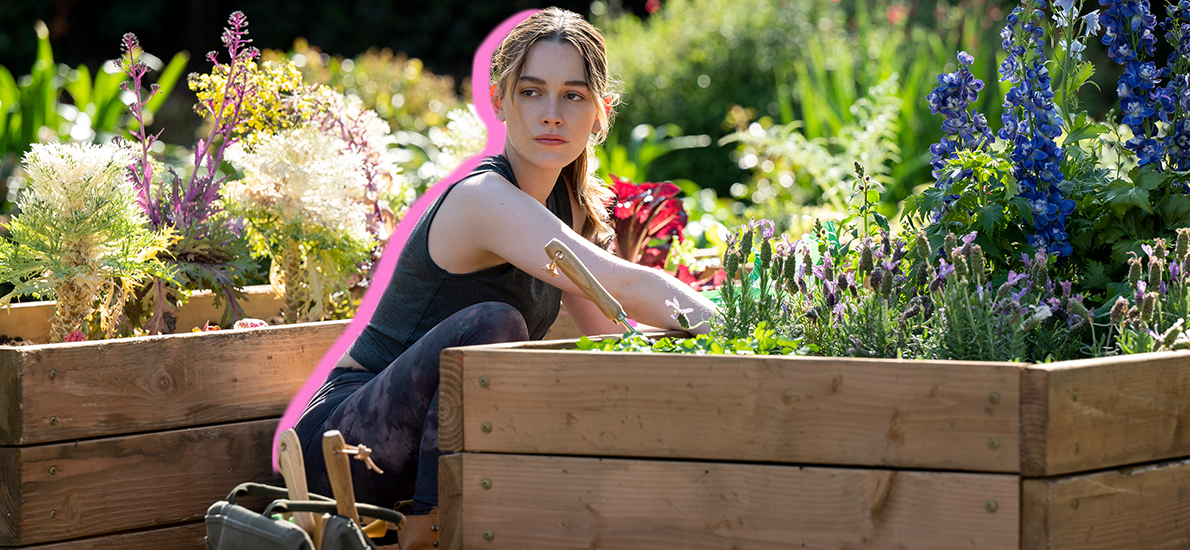Netflix just released the third season of You, and it is raking in views with an audience of around 111 million people. Dethroning Squid Game’s long reign as number one on Netflix, You is one of the most popular shows on the app, bringing in over 40 million people since its debut in 2018. People can’t wait to tune in to Joe Goldberg’s (Penn Badgley) chaotic antics, stalking women he once met across metropolitan areas, killing anyone who gets in his way. For a long time, Joe operated alone, flying under the radar by moving from New York to L.A after killing his first girlfriend Beck. For a while, everything seemed to be working out for Joe and his new California life.
Then he met Love.
At the end of season two, audiences thought Joe had finally met his match. Love Quinn (Victoria Pedretti), daughter of extremely wealthy parents Dottie and Ray Quinn, is an aspiring chef working in the high-end grocery store Anavrin when she meets Joe and subsequently falls in love with him over the course of season two. Upon season three’s opening, Joe and Love are trying to make it work as newlyweds in a soulless wealthy suburb outside San Francisco. The season follows all its usual twists and turns (sex, lies and murder) in a new setting. But the plot takes on an unsettling age-old trope and centers this season on Love as a predator sexually exploiting a young man. And unfortunately, this trope is hardly rare in film and television.
I’m talking about the Mrs. Robinson stereotype.
Coined after the 1967 movie The Graduate, Mrs. Robinson has become synonymous with older women seducing younger men. Set in the late 1960s, The Graduate follows recent college alumn Benjamin Braddock sifting through the trials and tribulations of young adulthood. He is feeling aimless and scared about his future, and falls into an affair with Mrs. Robinson (Anne Bancroft), an older woman stuck in a loveless marriage. Seeing as the 60s was considered to be a sexual revolution, a bored housewife gaining autonomy to pursue a younger gentleman was viewed as empowering and liberating, despite the moral ambiguity of the situation. Evolving with time, this harmful depiction of romance still has an impact today.
You’s Love is our latest example of this toxic characterization. Striking up an affair with her next-door neighbor Theo (Dylan Arnold), Love carries on a romance behind Joe’s back. After having sex with Theo, Love pulls away saying she shouldn’t see him, later going back on her word to continue the affair regardless. Love acknowledges her position of power, pointing out in one episode that she is wrong for having sex with a 19-year-old, yet she continues to abuse her power anyway, indicating to Theo that his feelings are valid only when she is manipulating them.
Knowing the relationship is wrong, Love continues to toy with Theo anyway, playing hot and cold games with a young man desperate for love. Here, the Mrs. Robinson stereotype is in play. Love provides emotional dependence for a teenager, who by the way, has just lost his stepmother, which is a dynamic she later weaponizes to fulfill her own sexual desire. What is more, Love is motivated by the suspicion that Theo’s father has video footage proving that she and Joe are complicit in the murder of said stepmother. Love is using Theo for her own self-preservation, fully aware that he is in his most vulnerable state. Unlike Theo, Love is not in the relationship for human connection at all—she’s in it to keep herself and her husband out of prison.
(No spoilers but I’ll just say the relationship doesn’t end great for Theo.)
Age is an arbitrary number and often, that is used as an excuse to take advantage of young people. Though Theo is 19, above the legal age of consent, scientifically the teenage brain does not stop maturing until age 25. Neuroscientists and psychological evidence confirms that teens can make cognitively rational choices when facing minimal pressure, but in situations like sexual encounters, teenagers cannot make decisions the same way adults can, leaving them vulnerable to dangerous situations.
The Mrs. Robinson trope has been resurfacing in television lately. Before You, there was A Teacher, the Hulu show no one could stop talking about last fall. Premiering November 2020, the show followed a predatory relationship between English teacher Claire Wilson (Kate Mara) and her 18-year-old student Eric Walker (Nick Robinson). Despite not being picked up for another season, the miniseries quickly became FX’s most watched show on Hulu. Despite the fact that the relationship is predatory (not to mention, very illegal), users on Tiktok sensationalized the affair for how “hot” it was, going as far as saying they should “change career paths” to better model Claire’s lifestyle. Of course, the show’s intention was to highlight how an event like this can take over someone’s life, but the fact some people hoped Nick and Claire end up together sheds light on how portraying toxic relationships can sometimes backfire, despite best intentions.
Nobody should be looking to You for relationship goals, but when accounts of older women abusing their power pop up consistently over time, in real life and in Hollywood, it is important to highlight why harmful relationships between older women and younger men should not be sensationalized. As a new generation grows alongside television, subjecting themselves to popular media featuring romance centered around imbalances of power, it’s important to avoid romanticizing these kinds of relationships and overlooking the toxicity and danger they pose.
Image: John P. Fleenor / Netflix








































